
You’ve probably heard some people say they will only ever paddle a hard board, and then others say an inflatable SUP is the way to go. So who’s right? Well to put it simply, there is a time and a place for both and you’ll see both types out on the water on any session.
Choosing between an inflatable SUP (iSUP) or a hard board really comes down to the following;
- What sort of paddler are you? And what do you want to use your SUP for?
- How do you plan to transport your SUP?
- Where do you plan to store your SUP?
- What is your SUP budget?
- How rough are you on your equipment?!!
What sort of paddler are you? And what do you want to use your SUP for?
The performance paddler
If you want to race at a high level, and enter sprint, distance and BOP (battle of the paddle) events, it will be very hard to find one board that suits all conditions. Hence, you see top racers with a line up of boards on the beach! These are generally of lightweight carbon construction, making them stiffer and more responsive. Although some of the race-specific iSUP boards are up there with glass fibre race boards in the speed stakes, but they do suffer when it comes to racing in swell or off the beach, due to the boards flexing slightly. Any flex will decrease the overall speed of the board. If you are racing seriously no doubt you will have a few boards in your collection anyway. But in the flat water events, taking place on lakes and rivers, there is really no reason why you shouldn’t see an iSUP on the podium this year.
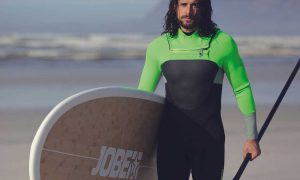 For the performance SUP surfer there are so many variables to consider, such as rocker line, rail shape, bottom profile, fin setup and volume size. iSUP’s do not have the variety of bottom or rails shapes like a hard board, and therefore you can not expect them to perform like a hard board. However that doesn’t mean you can’t surf on an iSUP. Of course you can… you’re just unlikely to win the world tour on one!
For the performance SUP surfer there are so many variables to consider, such as rocker line, rail shape, bottom profile, fin setup and volume size. iSUP’s do not have the variety of bottom or rails shapes like a hard board, and therefore you can not expect them to perform like a hard board. However that doesn’t mean you can’t surf on an iSUP. Of course you can… you’re just unlikely to win the world tour on one!
The general paddler (that’s most of us!)
Does this sound like you? Do you want to paddle every weekend or as much as you can? If so, then this is where you fit right in the middle of the inflatable / hard board mix. You could have an iSUP or you could have a hard board. Or both! The surf SUPer has their hard “performance” SUP, and also an iSUP for cruising up the rivers when it’s flat. If you think that you are going to get into paddleboarding but have to decide on one board, the best thing you could do is to demo or rent both boards from your local SUP shop/school and go paddling. You will get a feel for each of the boards and how they paddle, and that will help you make a decision.
The summer season paddler
 You’re the one who gets out paddling on those nice sunny days or when you’re on holiday. Your board choice is unlikely to come down to performance and perhaps your suggested choice should be iSUP, but more personal preference regarding the feel of the board, and practicality. So the best thing to do is to demo/rent both styles of boards and just try them out for feel. And then think about the storage and transportation issues!
You’re the one who gets out paddling on those nice sunny days or when you’re on holiday. Your board choice is unlikely to come down to performance and perhaps your suggested choice should be iSUP, but more personal preference regarding the feel of the board, and practicality. So the best thing to do is to demo/rent both styles of boards and just try them out for feel. And then think about the storage and transportation issues!
How do you plan to transport your SUP?
 Transporting an iSUP is definitely easier than a hard SUP. You don’t have to have a roof rack or large van. Just deflate it, pack it in its bag and put it in the boot of the car. Also if you like to travel abroad, then flying with an iSUP is a joy. No worries about whether your boards going to come out of the plane in one piece! And no excess board charges. Just book it on as a normal bag and off you go. Also, walking with a backpack to your secret spot a mile along the coast, is alot easier than with a hard board in your hand.
Transporting an iSUP is definitely easier than a hard SUP. You don’t have to have a roof rack or large van. Just deflate it, pack it in its bag and put it in the boot of the car. Also if you like to travel abroad, then flying with an iSUP is a joy. No worries about whether your boards going to come out of the plane in one piece! And no excess board charges. Just book it on as a normal bag and off you go. Also, walking with a backpack to your secret spot a mile along the coast, is alot easier than with a hard board in your hand.
How do you plan to store your SUP?
Paddleboard storage is a big issue and often the deciding factor when it comes to deciding between an iSUP or hard SUP. Ideally you should try to store your paddleboard in a cool, dry place. With a hard board this means you really need either a garage or a shed (unless you want a board in the middle of your lounge!) And obviously if you have a 14′ race board you’re going to need a big one! An iSUP however can be stored almost anywhere, even in your wardrobe! So if storage space is an issue, then really your decision has been made for you, get an iSUP or they’ll be no SUP!
What is your SUP budget?
This can be the largest factor when buying a SUP. How much do you want to spend? You will find that in general the cost of an iSUP will be less than the equivalent sized hard SUP.
We have a range of boards to suit all budgets and all riders. Check out our “best board for you” table to see which board is best for the rider weight.
How rough are you on your kit?
 If you want to get into white water paddling or think you’re likely to drive over your board in the carpark then an iSUP is for you! When it comes to durability an iSUP wins hands down.
If you want to get into white water paddling or think you’re likely to drive over your board in the carpark then an iSUP is for you! When it comes to durability an iSUP wins hands down.
Most of the damage done to a paddleboard is done during transport, to and from the waters edge.
If you’re good to your kit and not planning to have any fights with hard objects… then going for hard is a good option. If you want the whole family and the dog on the board, or go sliding down the riverbank… then go for an iSUP.
In summary
There are so many more pro’s and con’s to each type of board. In the end most paddlers would love to have both. It all comes down to what suits you and your circumstances best.
Let us know what you’re paddling on and why. Email us at hello@newforestsurf.co.uk
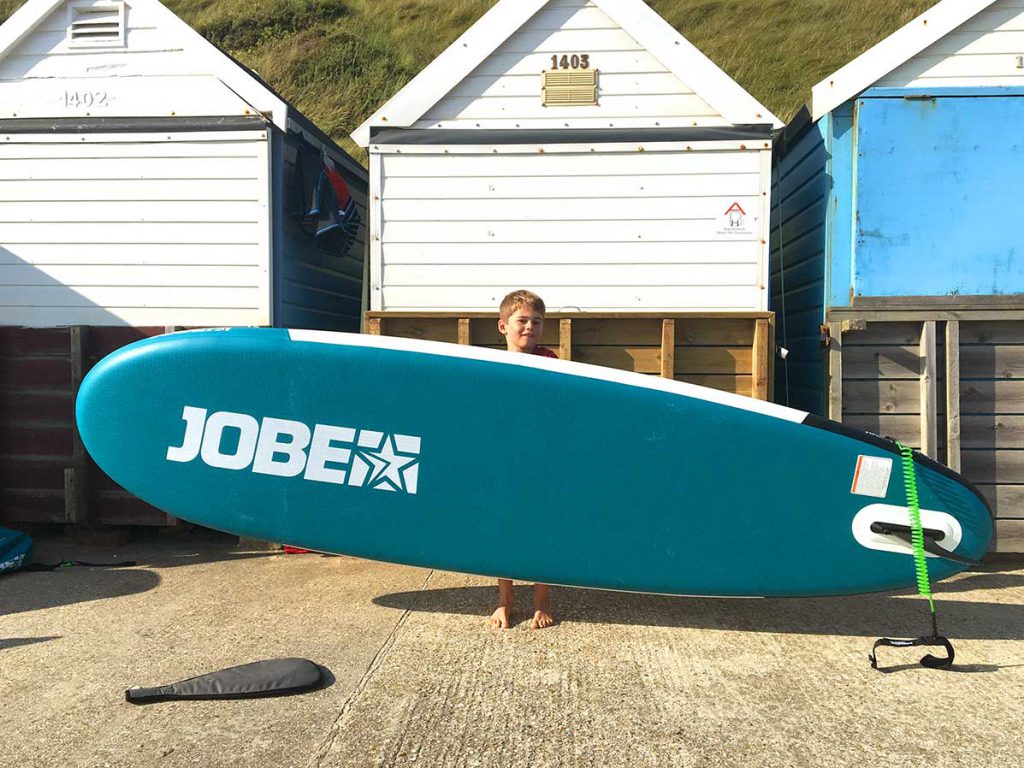
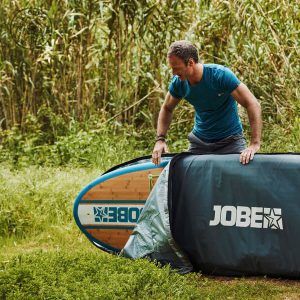
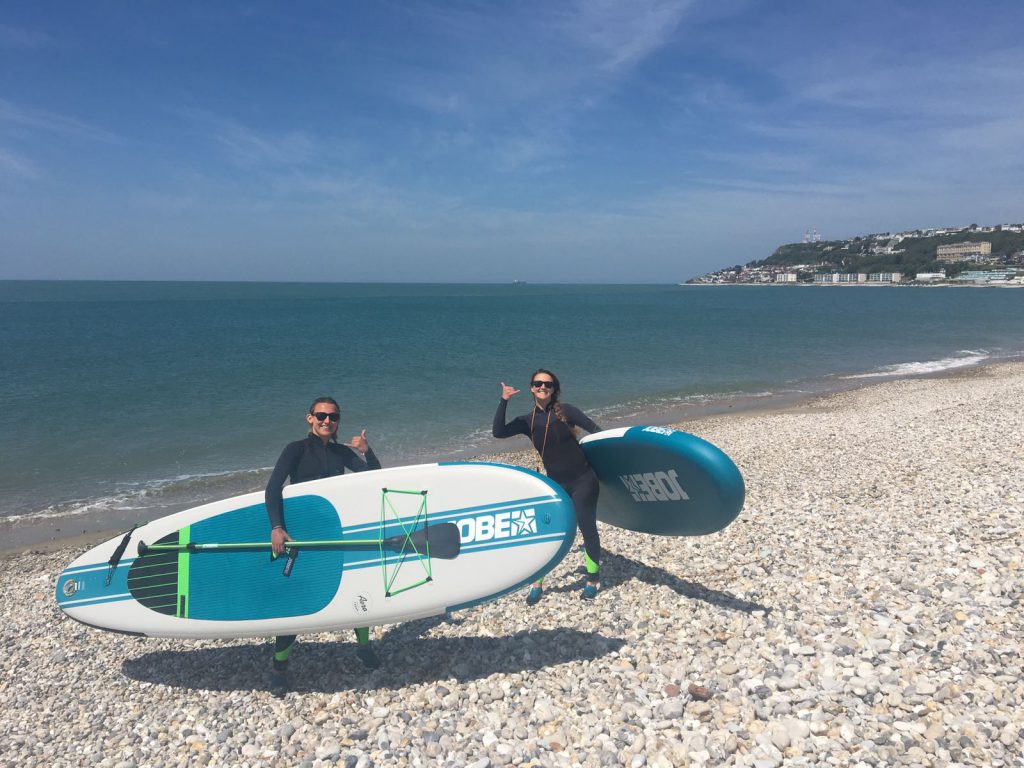
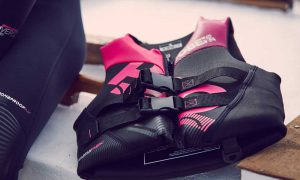
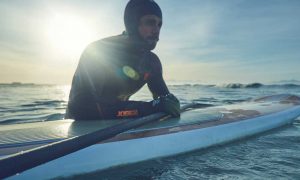 Spring: full length wetsuits are best even on sunny days as the water hasn’t warmed up yet. If you feel the cold – you could invest in some wetsuit gloves.
Spring: full length wetsuits are best even on sunny days as the water hasn’t warmed up yet. If you feel the cold – you could invest in some wetsuit gloves.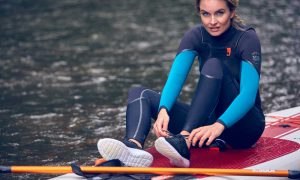 Winter: Don’t let the cold stop you getting out on the water. You’ll need to wear a full winter suit of at least 5mm, probably wetsuit boots and gloves and also consider a wetsuit balaclava – especially if your SUP session is on the beach to avoid any ice-cream headaches!
Winter: Don’t let the cold stop you getting out on the water. You’ll need to wear a full winter suit of at least 5mm, probably wetsuit boots and gloves and also consider a wetsuit balaclava – especially if your SUP session is on the beach to avoid any ice-cream headaches!
 For the performance SUP surfer there are so many variables to consider, such as rocker line, rail shape, bottom profile, fin setup and volume size. iSUP’s do not have the variety of bottom or rails shapes like a hard board, and therefore you can not expect them to perform like a hard board. However that doesn’t mean you can’t surf on an iSUP. Of course you can… you’re just unlikely to win the world tour on one!
For the performance SUP surfer there are so many variables to consider, such as rocker line, rail shape, bottom profile, fin setup and volume size. iSUP’s do not have the variety of bottom or rails shapes like a hard board, and therefore you can not expect them to perform like a hard board. However that doesn’t mean you can’t surf on an iSUP. Of course you can… you’re just unlikely to win the world tour on one! You’re the one who gets out paddling on those nice sunny days or when you’re on holiday. Your board choice is unlikely to come down to performance and perhaps your suggested choice should be iSUP, but more personal preference regarding the feel of the board, and practicality. So the best thing to do is to demo/rent both styles of boards and just try them out for feel. And then think about the storage and transportation issues!
You’re the one who gets out paddling on those nice sunny days or when you’re on holiday. Your board choice is unlikely to come down to performance and perhaps your suggested choice should be iSUP, but more personal preference regarding the feel of the board, and practicality. So the best thing to do is to demo/rent both styles of boards and just try them out for feel. And then think about the storage and transportation issues! Transporting an iSUP is definitely easier than a hard SUP. You don’t have to have a roof rack or large van. Just deflate it, pack it in its bag and put it in the boot of the car. Also if you like to travel abroad, then flying with an iSUP is a joy. No worries about whether your boards going to come out of the plane in one piece! And no excess board charges. Just book it on as a normal bag and off you go. Also, walking with a backpack to your secret spot a mile along the coast, is alot easier than with a hard board in your hand.
Transporting an iSUP is definitely easier than a hard SUP. You don’t have to have a roof rack or large van. Just deflate it, pack it in its bag and put it in the boot of the car. Also if you like to travel abroad, then flying with an iSUP is a joy. No worries about whether your boards going to come out of the plane in one piece! And no excess board charges. Just book it on as a normal bag and off you go. Also, walking with a backpack to your secret spot a mile along the coast, is alot easier than with a hard board in your hand. If you want to get into white water paddling or think you’re likely to drive over your board in the carpark then an iSUP is for you! When it comes to durability an iSUP wins hands down.
If you want to get into white water paddling or think you’re likely to drive over your board in the carpark then an iSUP is for you! When it comes to durability an iSUP wins hands down.



